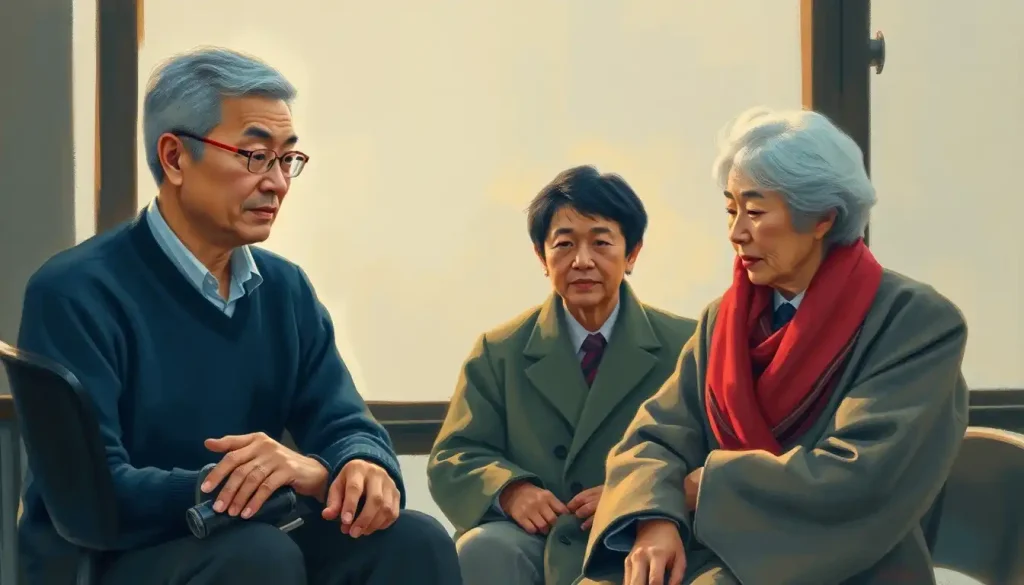Facing a rapidly aging society and one of Asia’s lowest birth rates, millions of Taiwanese workers are grappling with crucial decisions about their retirement timing and financial security in a system that’s undergone dramatic changes in recent years. The landscape of retirement in Taiwan is a complex tapestry woven from traditional values, modern economic realities, and evolving government policies. As the island nation navigates these choppy waters, understanding the intricacies of its retirement system becomes not just important, but essential for both current and future retirees.
Taiwan’s demographic challenges are stark and pressing. With a rapidly graying population and a birth rate that’s plummeted to alarming lows, the country faces a future where fewer workers will support an ever-growing number of retirees. This demographic shift isn’t just a statistic – it’s a seismic force reshaping the very foundations of Taiwanese society and its economy.
The Nuts and Bolts of Taiwan’s Official Retirement Age
When it comes to hanging up one’s work boots in Taiwan, the picture isn’t as clear-cut as one might expect. The statutory retirement age for public sector employees has been a moving target in recent years, reflecting the government’s efforts to adapt to demographic realities.
Currently, the retirement age for civil servants is set at 65 years. However, this wasn’t always the case. The government has gradually increased this age from 60 to 65, implementing the change in phases to ease the transition. This shift mirrors similar trends across Asia, as countries grapple with aging populations and the need to keep experienced workers in the workforce longer.
In the private sector, the story is a bit different. There’s more flexibility, but also more uncertainty. While 65 is often considered the standard retirement age, many companies have their own policies. Some encourage earlier retirement, while others are increasingly open to keeping valuable employees on board well past the traditional retirement age.
Interestingly, Taiwan doesn’t have different official retirement ages for men and women, unlike some of its Asian neighbors. This gender-neutral approach reflects Taiwan’s progressive stance on workplace equality. However, it’s worth noting that social norms and family responsibilities can still influence retirement decisions differently for men and women.
Decoding Taiwan’s Pension Puzzle
Taiwan’s pension system is a multi-layered affair, designed to provide a safety net for retirees from various walks of life. At its core is the National Pension System, a program aimed at providing basic coverage for all citizens not covered by other occupational pension schemes.
For private sector workers, the Labor Pension System is the primary vehicle for retirement savings. This system underwent a major overhaul in 2005, shifting from a defined benefit plan to a defined contribution plan. Under the new system, employers are required to contribute at least 6% of an employee’s monthly salary to an individual account. Employees can also make voluntary contributions.
Government employees, on the other hand, are covered by the Public Service Pension Fund. This fund has also seen significant reforms in recent years, aimed at ensuring its long-term sustainability. These changes have included increasing contribution rates and adjusting benefit calculations.
The pension reforms of recent years have been both necessary and controversial. Aimed at addressing the system’s financial sustainability in the face of demographic challenges, these reforms have generally meant working longer and receiving somewhat reduced benefits. While these changes have sparked protests and debates, they reflect the government’s attempt to balance fiscal responsibility with social welfare.
It’s worth noting that Taiwan’s approach to retirement security shares some similarities with its neighbors. For instance, Korea’s retirement age and pension system have also undergone significant changes in recent years, reflecting similar demographic pressures.
The Many Factors Shaping Retirement Decisions in Taiwan
When it comes to deciding when to retire in Taiwan, it’s not just about reaching a magic number on one’s birthday. A complex web of factors influences this crucial life decision.
Economic considerations loom large. With living costs in urban areas like Taipei continuing to rise, many Taiwanese workers find themselves needing to work longer to ensure financial stability in retirement. The specter of inflation and the desire to maintain a comfortable standard of living push many to delay retirement.
Health and life expectancy also play a significant role. Taiwan boasts one of the world’s highest life expectancies, thanks in part to its excellent healthcare system. This longevity is a double-edged sword when it comes to retirement planning. On one hand, it means potentially more years to enjoy retirement. On the other, it requires careful financial planning to ensure savings last through a potentially long retirement period.
Cultural attitudes towards work and retirement in Taiwan are evolving, but still retain some traditional elements. Work ethic is highly valued in Taiwanese society, and many older workers find a sense of purpose and identity in their jobs. This can make the transition to retirement challenging for some.
Family responsibilities and expectations add another layer of complexity to retirement decisions. In Taiwan, as in many Asian cultures, there’s often an expectation that adult children will support their aging parents. This can influence retirement timing in both directions – some may retire earlier knowing they have family support, while others may work longer to provide for their families.
Navigating the Golden Years: Challenges and Opportunities for Taiwan’s Retirees
Retirement in Taiwan comes with its own set of challenges and opportunities. Understanding these can help current and future retirees better prepare for this significant life transition.
The cost of living for retirees in Taiwan can vary significantly depending on location and lifestyle. While Taiwan is generally considered more affordable than some of its East Asian neighbors, urban areas like Taipei can be quite expensive. Retirees often need to carefully budget to ensure their savings and pension income can cover their needs.
One bright spot for retirees is Taiwan’s healthcare system. Known for its efficiency and affordability, the national health insurance system provides comprehensive coverage for the elderly. This can be a significant relief for retirees, as healthcare costs often increase with age.
Social support networks play a crucial role in the well-being of Taiwanese retirees. Traditional family structures, where multiple generations live together, are becoming less common in urban areas. However, community centers and social groups for seniors are increasingly filling this gap, providing opportunities for socializing and staying active.
For those seeking to stay engaged after formal retirement, Taiwan offers various opportunities for post-retirement work and volunteering. Many retirees find part-time jobs or consulting roles that allow them to continue using their skills while enjoying a more flexible lifestyle. Volunteering, particularly in areas like education and community service, is also popular among retirees.
It’s interesting to note that this trend of active retirement is not unique to Taiwan. In neighboring Japan, the concept of retirement age is also evolving, with many seniors choosing to remain active in the workforce or community well into their golden years.
Charting Your Course: Preparing for Retirement in Taiwan
Given the complexities of Taiwan’s retirement landscape, careful preparation is key to ensuring a comfortable and fulfilling retirement.
Financial planning is, of course, a cornerstone of retirement preparation. This involves more than just relying on pension systems. Many financial advisors in Taiwan recommend a diversified approach, including personal savings, investments, and possibly real estate. The earlier one starts planning, the better, given the power of compound interest.
Health and wellness considerations are equally important. Maintaining good health can not only improve quality of life in retirement but also help manage healthcare costs. Many Taiwanese engage in regular exercise, with activities like tai chi and hiking being particularly popular among older adults.
There are also legal and documentation requirements to consider when preparing for retirement in Taiwan. This includes ensuring all pension and insurance documents are in order, as well as considering estate planning and healthcare directives.
Fortunately, there are numerous resources and support services available for retirees in Taiwan. Government agencies, non-profit organizations, and private companies offer various programs and services aimed at helping seniors navigate retirement. These range from financial planning workshops to health education programs and social activities.
As we wrap up our exploration of Taiwan’s retirement landscape, it’s clear that while challenges exist, there are also many opportunities for a fulfilling retirement in this dynamic island nation. The key lies in understanding the system, planning ahead, and remaining adaptable.
Taiwan’s approach to retirement age and pension systems continues to evolve in response to demographic and economic realities. While the official retirement age hovers around 65 for many, the actual experience of retirement is far more nuanced and individual.
Looking to the future, it’s likely that Taiwan will continue to adjust its retirement policies and support systems. The government faces the ongoing challenge of balancing an aging population with economic sustainability. For individuals, this underscores the importance of personal preparation and adaptability.
In many ways, Taiwan’s retirement landscape reflects broader trends across Asia. From China’s recent changes to retirement age to Malaysia’s evolving retirement policies, countries across the region are grappling with similar challenges.
As Taiwan charts its course through these demographic shifts, one thing is clear: retirement in the 21st century is not a one-size-fits-all proposition. It requires careful planning, an understanding of the available systems and support, and a willingness to adapt to changing circumstances. By embracing these principles, Taiwan’s retirees can look forward to golden years that are not just comfortable, but truly golden.
References:
1. National Development Council, Taiwan. “Population Projections for the Republic of China (Taiwan): 2020-2070.”
2. Bureau of Labor Insurance, Ministry of Labor, Taiwan. “Labor Pension Act.”
3. Ministry of Civil Service, Taiwan. “Public Service Pension Fund Management Board.”
4. National Health Insurance Administration, Ministry of Health and Welfare, Taiwan. “National Health Insurance Annual Report.”
5. Directorate-General of Budget, Accounting and Statistics, Executive Yuan, Taiwan. “Statistical Yearbook of the Republic of China.”
6. Taiwan Pension Fund Association. “Taiwan Pension System Overview.”
7. World Health Organization. “World Health Statistics 2021: Monitoring Health for the SDGs.”
8. OECD. “Pensions at a Glance 2021: OECD and G20 Indicators.”
9. Ministry of Health and Welfare, Taiwan. “Report on the Senior Citizen Condition Survey.”
10. Financial Supervisory Commission, Taiwan. “Retirement Planning and Financial Education Programs.”












Would you like to add any comments? (optional)